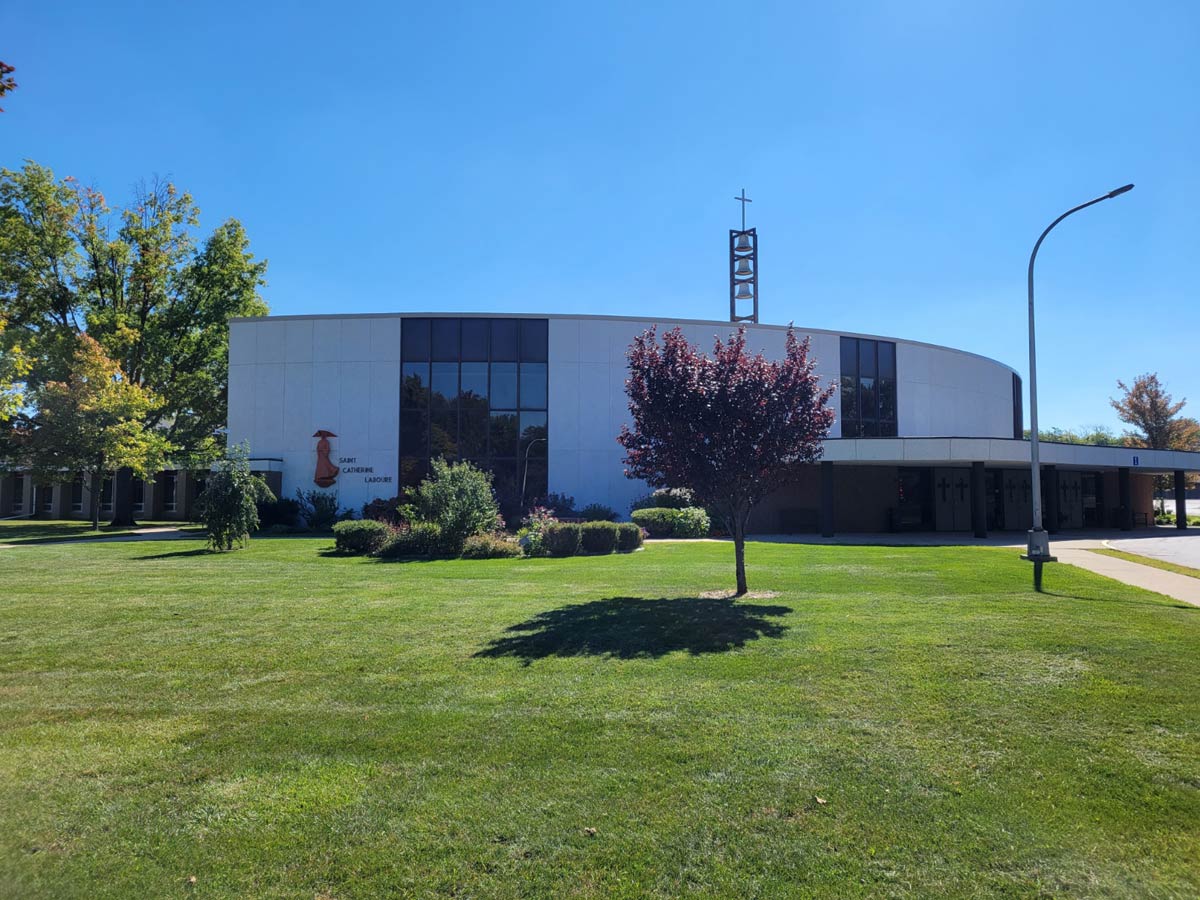Fr. Lara's Lines

The Most Holy Trinity
The Solemnity of the Most Holy Trinity
The Church celebrates the Feast of the Most Holy Trinity the
Sunday after Pentecost. The doctrine of the Holy Trinity
states that God is one in three persons: Father, Son, and
Holy Spirit. These three persons are co-equal, co-eternal,
and share the same divine nature. At the same time, these
three persons are not the same individual; the Father is not
the Son nor the Holy Spirit; the Son is not the Holy Spirit nor
the Father; the Holy Spirit is not Father nor the Son. This
particular teaching of the Church emphasizes the unity of
God and the distinctness of each person. This doctrine might
seem confusing or even contradicting to our understanding
of logical arguments. The doctrine of the Holy Trinity is an
attempt to understand the mystery of God, even though we
will not fully grasp who God is until He is fully revealed to
us in heaven.
Every Sunday at Mass, we recite the creed, or the
profession of faith. We express our belief in one God, the
Father Almighty who made heaven and earth; we also
believe in his only begotten Son, consubstantial with the
Father, who for our salvation came down from heaven; and
in the Holy Spirit, who proceeds from the Father and the
Son. This mystery tells us about the union of God and the
uniqueness and relationship between each person. Although
it is impossible to understand God since our minds are
limited by the experience of this world. One can say that
the Father is the one who creates, the Son is the one who
redeems, and the Holy Spirit is the one who sanctifies. The
understanding of a creator, redeemer, and sanctifier helps
us to categorize what each person does in God’s creation.
This does not give us a thorough knowledge of who God
really is. Other theologians might approach the dynamic of
the Holy Trinity within the context of God’s love. God is the
lover, the Son is the beloved, and the Holy Spirit is the love
shared between the Father and the Son.
Pope Leo XIV
It has been more than a month since Pope Leo XIV was
elected Bishop of Rome. The moment he stepped out of St.
Peter’s Basilica’s Balcony, his life as a cardinal was
changed dramatically. One cannot understand the spiritual
responsibility that is entrusted to the Bishop of Rome. The
Holy Spirit worked through the cardinals to give us a
wonderful Pope. Pope Leo XIV has been busy at work,
stepping onto the world stage. From continuing to the
jubilee celebrations in Rome to meeting with world leaders,
Pope Leo XIV has already made a significant and
meaningful impact on the life of the Church. His pastoral
heart and leadership skills are a blessing to a world that is
constantly changing. The archdiocese of Chicago celebrat-
ed a special Mass on Saturday, June 14th, at Rate Field in
honor of Pope Leo XIV. Pope Leo was born in Chicago as
Robert Prevost. He was raised in the nearby suburb of Dol-
ton, Illinois. Since he has been a big fan of the Chicago
White Sox, Rate Field was a good place to hold these fes-
tivities. This was an extraordinary opportunity for people
from the archdiocese to come together in honor of the first
U.S. and Chicago-born Pope. Cardinal Cupich and all the
bishops of Chicago echoed the Pope’s message of peace
and unity. This was truly a celebration of our faith that unit-
ed people from all over. We are proud to call Pope Leo
one of our own. We pray for Pope Leo XIV. May the Holy
Spirit guide his ministry to the universal Church.
Father's Day
On Father’s Day, we want to honor all fathers and father
figures who constantly give so much of themselves for the
good of their families. We also want to remember all
fathers who have gone before us. Although they are not
physically present with us, their spiritual presence remains
in our hearts. Being a father is an incredible gift. Being a
father requires sacrifices for the love of their families, but
the graces that come from that far surpass the challenging
times. This Sunday is a good time for us to honor them in a
special way. It is a good time for us to thank all fathers
and father figures in our lives. We are forever grateful for
all they have done for us, their children. We also pray for
all fathers who have passed away. May they be
welcomed into God’s kingdom in heaven. I hope you all
have a great Father’s Day celebration. May God give
you love, peace, and strength. Happy Father’s Day!
God our Father, in Your wisdom and love You made all
things. Bless these men, that they may be strengthened as
Christian fathers. Let the example of their faith and love shine
forth. Grant that we, their sons and daughters, may honor
them always with a spirit of profound respect.
Grant this through Christ our Lord.
Updates in the Parish
Beginning Tuesday, June 17th, the parish offices will be
moving into the offices in the former school. The new
address of the office is 3425 Thornwood Ave, Glenview, IL
60026. You can visit the office through the entrance at the
front doors by the circle driveway. Office hours are Mon-
day-Friday 8:30am –2:00pm and Saturday 9:00am-noon.
For the time being the office number will remain the same
847-729-1414.
Beginning on Wednesday, July 2nd, Wednesday masses
will be held at 8:00am. All weekday masses will be held
at 8:00am Monday—Saturday.
Peace
Fr. Lara
The Pope's Intention for the Month of June
 That the world might grow in compassion
That the world might grow in compassion
That each one of us might find consolation
in a personal relationship with Jesus, and
from His Heart, learn to have compassion
on the world
Recognize God in Your Oridinary Moments - By Colleen Jurkiewicz Dorman
Mini Reflection:Why do we love mysteries so much?
Because God is a mystery. And that’s never as clear
as it is today, on the Feast of the Most Holy Trinity, the
mystery that boondoggles us all. Four relations. Three
persons. One God.
The Best Kind of Mystery
“Do you have a mystery for me to solve?”
If I’ve heard it once, I’ve heard it a hundred times. My
daughter is obsessed with mysteries. It’s not enough
for her to read about them in the pages of every
Nancy Drew book she can get her hands on. She
wants more than that. She wants a real-life mystery. A
puzzle that resists being solved. A question that eludes
an answer. Something that isn’t easy to wrap her head
around.
And not surprisingly, she’s not satisfied with the
“mysteries” I can offer her. The Mystery of Mom’s
Missing Hair Tie (spoiler alert: it was in my purse). The
Mystery of the Missing Lunch Ham (oops, Mom finished it).
Simple answers are so boring. “Will I ever have a
real mystery?” she moans.
I get it. We’re all this way, really. We are drawn to
the mysterious, to the inscrutable. It’s because we know
that the answers to the really big questions are ones
that can’t be explained in a neat and tidy way. We
know that the reality of life and love and the human
condition is something we can’t quite fit our heads
around. We know that there is so much in this world, in
this universe, that we can’t…understand. So, in a way,
mysteries are the only things that really make sense to
us.
Why do we love mysteries so much? Because God is a
mystery. And that’s never as clear as it is today, on
the Feast of the Most Holy Trinity, the mystery that
boondoggles us all. Four relations. Three persons. One
God.
Don’t ask me to explain it. I could, but I don’t have the
word space, and frankly, it might not even make sense
then. It’s a mystery, you see. A real one. The best kind.
©LPi
Honor Our Military
Please take time to give thanks for those who have served and
are serving in our military and to pray for the safety of those who
may currently be in harm’s way. In a special way, we thank and
pray for these parishioners and relatives of parishioners.
Dear God,
We pray in gratitude for all of those who have defended
peace, virtue, and justice with honor. We pray especially
for those who have suffered in mind and body from the
ravages of war. May Your peace reign in our hearts
and in our world. Amen.
He Who Sacrificed His Life
†JOHN A. STONIS, Grandson of John & Dorthy Stonis
†CHRISTOPHER ZIMNY
Those Still Serving
CRAIG BEHRENDT, Grand-nephew of Sister Mary Helen
DANIEL BELZER, Nephew of Dave & Bev Belzer
RYAN BLOCHBERGER, Nephew of Mae Grady
JESSICA CAMERON, Niece of the Cameron Family
BRYAN DUFF, Son of Julie Duff
TIMOTHY DWORKIN, Grandson of Barbara Bouska
MICHAEL FOLEY
JOHN FOLEY
RYAN FONTILLAS
DANIEL FRAYNA
ALEXIS GONZALES, Great-niece of Eden & Lyle Gonzales-Nemzin
JOSEPH GULLO
MICHAEL T. HAHN, Grandson of John & Dorthy Stonis
SANG HOON LEE
MICHAEL KELLY, Nephew of Kevin and Kathy Kelly
JACK MAHON, JR., Son of Jack, Sr. & Eileen Mahon
JAY MARTIN, Nephew of Becky and Tom Brennan
MORRIS COREY MCMAHON, Son of Chris & Julie McMahon
PETER MULLER
MATTHEW NEUBAUER, Nephew of Dan & Judy Neubauer
ANTHONY PALMERO
JOHN PODCZASKI, Grandson of Genevieve Podczaski
NAILL SWIDER, Grand-nephew of Alice Swider
STEVEN TUMBARELLO, Son of Sylvia & Vince Tumbarello
EUGENE WALL, Nephew of Suzanne Lessner
To add or remove someone, please send the person’s name and relationship (optional) to bulletin@stcatherinelaboure.com
Please Pray for Ukraine
For our sisters and brothers involved in or
affected by the war and devastation in Ukraine--
the deceased, the injured, the frightened, the
displaced, the fighters, the protesters, the leaders.
May God give them solace, healing, comfort, and
hearts and minds directed toward peace.
Donations can be made here:
Knights of Columbus: https://www.kofc.org/secure/en/donate/ukraine.html
Caritas: https://www.caritas.org/
Ukrainian Catholic Archdiocese of Philidelphia: https://ukrarcheparchy.us
"May the Queen of Peace preserve the world from the madness of war" - Pope Francis
Neighbors of other Faiths
The Golden Rule
Excerpted from charterforcompassion.org/the-golden-rule-in-seven-major-religions
We may speak of great differences in
religious beliefs and forms of worship
around the world. Called by an endless
number of names, all, however, recognize and worship a Supreme
Being. And all religions, somewhere in their sacred literature,
expound the fundamental philosophy of the Golden Rule.
Buddhism: Hurt not others with that which pains yourself.
~ Buddha, Undanavarga 5:18
Christianity: Therefore all things whatsoever ye would that all men
should do to you, do ye even so to them.
~ Matthew 7:12
Confucianism: What you do not want done to yourself, do not do
to others.
~ Confucius, Analects 15:23
Hinduism: Good people proceed while considering what is best
for others is best for themselves.
~ Hitopadesa
Islamism: No one of you is a believer until he loves for his brother
what he loves for himself.
~ Mohammed, Traditions
Judaism: And thou shalt love thy neighbor as thyself.
~ Leviticus 19:18
Zoroastrianism: Whatever is disagreeable to yourself do not do
unto others.
~ Shayast-na-Shayast 13:29
